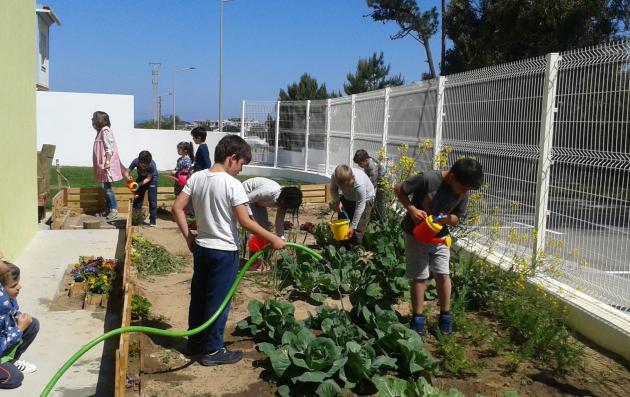Date of label : 29/10/2024
-
Torres Vedras , Portugal
-
Size of city : 80.000 inhabitants

A group of children engaged in gardening activities in an outdoor setting, likely a school or community garden. The image captures a lively and educational moment where children are learning about gardening and nature in a hands-on manner.
Summary
The Sustainable Food School Programme provides healthy school meals in Torres Vedras (PT), addressing social, ecological, and sustainable aspects, and focusing on product freshness, territorial development, and job creation.
The Programme is based on four pillars:
- Production: School gardens and farm visits.
- Acquisition: Short food supply chains.
- Cooking: Municipal kitchens, and a network of kitchens in private social institutions.
- Consumption: Promotion of healthy eating habits.
The solutions offered by the Good Practice
The Sustainable Food School Programme delivers healthy and high-quality school meals in a social, ecological, and sustainable manner.
Actions are structured around four pillars:
Production: Organic school gardens and farm study visits promote sustainable practices.
Acquisition: Division of procurement tenders into small lots, enabling the purchase of high-quality, fresh raw food materials directly from local small- and medium-sized producers and suppliers, thus promoting short food supply chains.
Cooking: Five municipal kitchens cook meals for schools in the city area. Outside the city area, 12 Public Local Authorities (PLAs) contract school meal services to local Private Social Solidarity Institutions (PSSIs), whose kitchens cook and distribute lunches daily to their respective local schools. The Municipality pays the PLAs monthly for the meals served, and the PLAs, in turn, pay the PSSI.
Consumption: Initiatives increase knowledge, and promote healthy food choices and physical activity. Three examples: separation of food waste after meals by students; "Lunch With Me on my Birthday" - families eat with their child in the school on their birthday; and “October Food Month” – month dedicated to food activities.
Building on the sustainable and integrated urban approach
The Sustainable Food School Programme delivers multiple social, economic and environmental benefits.
Socio-economic: The entire Torres Vedras population potentially benefits, including students, families, school staff, teachers, local agro-industrial sector, market, and non-profit organisations. About 80 jobs were created in private social institutions and 40 in municipal kitchens. The local economy also benefits through the local sourcing of food.
Environmental: Purchasing food from small- and medium-sized producers, often daily, reduces ecological footprint, promotes short food supply chains and boosts the Circular Economy. Freshness is ensured by prioritising suppliers with shorter transport distances, which also reduces CO2 emissions. Organic fruits, vegetables and grocery products are integrated into meals. Managing food efficiently based on meal numbers and technical sheets, reduces food waste and production costs.
Nutritional: Seasonal menus based on local food culture and featuring high-quality organic products. Balancing macronutrients according to age groups for safer meals. Teaching organic farming using school gardens, with extracurricular programmes promoting healthy eating and sports, allows for measurable results.
Based on participatory approach
This programme potentially benefits the whole of the Torres Vedras population. Its activities encompass students, families, school staff, teachers, the local agro-industrial sector, market actors, and non-profit organisations. Indirectly, all users of social services provided by the non-profit organisations benefit.
Through the direct management of municipal kitchens, it is possible to know specifically the quantity and type of raw material needed throughout the year. This helps food producers, who know weekly product needs to be delivered to municipal kitchens. This facilitates product flows and reduces food waste.
Another factor reducing food waste is the inclusion of smaller fruit items for school meals (2 or 3 small pieces instead of 1 large one), and the use of deformed vegetables, which are used in soup, for example.
What difference has it made?
The Sustainable Food School Programme strategy:
- Enables the Municipality to manage public procurement for central kitchens, achieving lower tender values compared to managing multiple kitchens.
- Promotes the local economy by enabling private social institutions (PSIs) to purchase food from small and medium local farmers/suppliers, fostering short food chains. On average, each PSI engages with six local suppliers, including daily deliveries.
- Divides procurement into small lots for raw materials, prioritising quality criteria over price, emphasising food freshness, and favouring proximity from production sites to kitchens.
Notably, the practice created approximately 80 new jobs in PSIs and 40 in the five municipal kitchens, while promoting solidarity and social cohesion.
Revenue from school meal services enables PSIs to expand their services for the most disadvantaged, including the elderly. This self-sustaining model reduces dependency on ad hoc public support.
Lastly, this best practice reflects personal dedication from PSI workers who cook and procure high-quality ingredients as if preparing meals for their own families and communities.
Why this Good Practice should be transferred to other cities
The Sustainable Food School Programme provides high-quality meals for students, while stimulating the local economy through short food supply chains.
It is transferable to other cities and can be adapted according to the typology of each territory. The basis of the programme is the direct management and partnership with local institutions, but the way it works can be reinvented locally.
To transfer the programme, its essential factors also need to be replicated:
- A strong political will for implementation.
- Adequate infrastructure, and equipment for daily work in municipal kitchens.
- Staff from municipal employees, but hiring staff from external companies is possible.
- A structured collaborative network of social institutions, supported by the municipality.
- Good food sovereignty in the territory is beneficial, to guarantee the supply of the food raw materials.
The programme has been widely shared nationally and internationally through meetings, conferences, and visits to municipal and PSI kitchens.
Since 2020, the programme team has conducted approximately 50 dissemination activities, and has participated in international projects such as URBACT's Transfer Network of Biocanteens, Ellen MacArthur Foundation's Food Initiative, and ICLEI's Coach Beacons and SchoolFood4Change.
